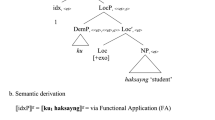Conclusion
We have seen that we cannot de-tense a sentence like (15) simply by changing its verb, since the tense of such a sentence is determined by a temporal adverb. More importantly, we have seen that de-tensing is a process of removing certain temporal restrictions from the truth-conditions of tensed sentences, and that tensed and tenseless forms of a verb do not differ in sense. Once we understand this, and once we realize that it is an historical accident that the tense of sentences in English if often indicated by means of the grammatical device of inflecting verbs, tensed verbs no longer seem to be the sort of item that needs to be purged from ordinary language in constructing its tenseless analogue. Indeed, although the distinction between tensed and tenseless verbs may still be of philosophic interest, this distinction hardly seems to deserve the pivotal role assigned to it in the literature.
Similar content being viewed by others
Author information
Authors and Affiliations
Rights and permissions
About this article
Cite this article
Braude, S.E. Are verbs tensed or tenseless?. Philosophical Studies 25, 373–390 (1974). https://doi.org/10.1007/BF00385907
Received:
Issue Date:
DOI: https://doi.org/10.1007/BF00385907



